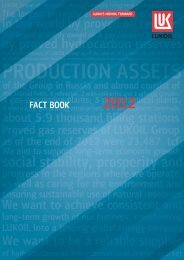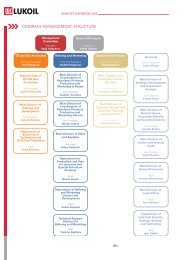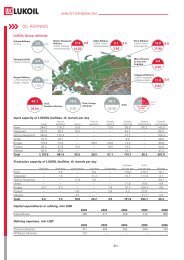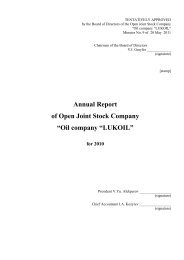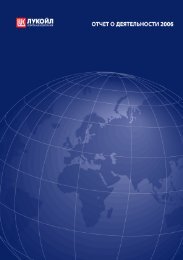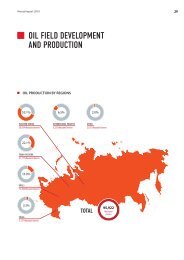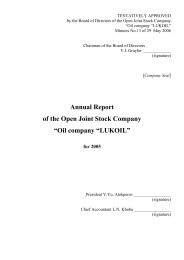ANNUAL REPORT 2005 - Lukoil
ANNUAL REPORT 2005 - Lukoil
ANNUAL REPORT 2005 - Lukoil
You also want an ePaper? Increase the reach of your titles
YUMPU automatically turns print PDFs into web optimized ePapers that Google loves.
double tax treaty and require the tax agent (i.e., the company paying dividends or the Russian purchaser of the shares)<br />
to withhold and pay tax, In practice, the most likely negative outcome for non-withholding of a tax are penalty, amounting<br />
to 20% of non-withheld tax and late payment interest.<br />
Otherwise a non-resident corporate holder seeking to obtain relief from Russian withholding tax under a tax treaty must<br />
provide a confirmation of its tax residence that complies with the applicable double tax treaty as well as the other<br />
documentation related to receiving such income in advance of receiving income. UK holders may obtain the confirmation<br />
by writing to their local UK tax inspector.<br />
In accordance with the Tax Code a non-resident holder who is an individual must present to the tax authorities a document<br />
on his or her tax residency and a document justifying the income received and the tax paid offshore, confirmed by<br />
the foreign tax authorities. Formally such requirement means that an individual cannot rely on the tax treaty until he or<br />
she pays the tax in the residence jurisdiction.<br />
If a non-resident does not obtain advance tax-treaty clearance and tax is withheld by a Russian resident on capital gains<br />
or other amounts, the non-resident holder may apply for a refund within three years from the end of the tax period in<br />
which the tax was withheld when the recipient is a company or within the one-year period from the end of the tax<br />
period in which the tax was withheld when the recipient is an individual. The legal entities are not entitled to grant refund<br />
to an individual.<br />
To process a claim for a refund for legal entities, the Russian tax authorities require (i) a confirmation of the residence of<br />
a non-resident at the time the income was paid, (ii) an application for refund of the tax withheld in a format provided by<br />
the Russian tax authorities and (iii) copies of the relevant contracts and payment documents confirming the payment of<br />
the tax withheld to the appropriate Russian authorities (Form 1012DT (2002) is applicable for legal entities only and is<br />
designed to combine (i) and (ii) for foreign corporate).<br />
For individual a refund is granted only upon the presentation of the a) an application for refund in any understandable by<br />
the tax authorities format; b) statement of all annual income of the individual (Form NDFL-2); c) a confirmation of residence.<br />
The refund of the tax withheld should be granted within one month of the filing of the application for the refund and the<br />
relevant documents have been filed with the Russian tax authorities. However, procedures for processing such claims<br />
have not been clearly established and there is significant uncertainty regarding the availability and timing of such refunds.<br />
The Russian tax authorities may require a Russian translation of some documents as well as to apply other requirements to<br />
the format of documents. Providing necessary documentation does not eliminate a risk of the tax authorities disputing the<br />
relief from withholding tax and requiring additional documentation in the form determinated by the particular inspection.<br />
CONSOLIDATED FINANCIAL STATEMENTS<br />
UNITED KINGDOM TAX CONSIDERATIONS<br />
The comments below are of a general nature based on current UK law and practice. They do not necessarily apply where<br />
the income is deemed for tax purposes to be the income of persons other than persons who are the absolute beneficial<br />
owners of DSs or ordinary shares. In particular these comments do not apply to the following:<br />
investors who do not hold their DSs or ordinary shares as capital assets;<br />
investors that own (or are deemed to own) 10% or more of our voting rights; or<br />
special classes of investors such as dealers.<br />
Withholding tax on dividends<br />
Dividend payments in respect of DSs or ordinary shares issued by a company organised under the laws of the Russian<br />
Federation should not be subject to UK withholding tax. As discussed in "-Russian tax considerations -Taxation of<br />
Dividends," such dividends will be subject to Russian withholding taxes.<br />
Taxation of Dividends<br />
A UK holder of interests in DSs or ordinary shares that receives a dividend on the DSs or ordinary shares may be<br />
subject to UK income tax or corporation tax, as the case may be, on the gross amount of any dividend paid before the<br />
deduction of any Russian withholding taxes, subject to the availability of any credit for Russian tax withheld. An individual<br />
holder of interests in DSs or ordinary shares who is resident and domiciled in the United Kingdom will generally be<br />
subject to UK income tax on the dividend paid on the DSs or ordinary shares. An individual holder of interests in DSs or<br />
ordinary shares who is resident but not domiciled in the United Kingdom (or is resident, but not ordinarily resident, and<br />
domiciled in the United Kingdom, and either a Commonwealth citizen (this includes a British citizen) or a citizen of the<br />
Republic of Ireland) will generally be subject to UK income tax on the dividend paid on the DSs or ordinary shares to the<br />
extent that the dividend is remitted to the United Kingdom. A dividend is remitted to the United Kingdom if it is paid to<br />
the United Kingdom or transmitted or brought to the United Kingdom in any way.<br />
177



